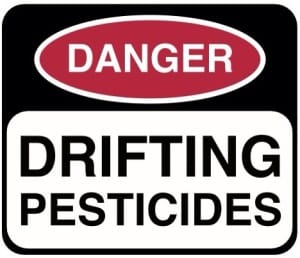Cornucopia’s Take: The EPA’s approval of Monsanto’s XtendiMax with VaporGrip Technology herbicide is projected to increase dicamba use from less than one million pounds to more than 25 million annually on soy and cotton fields. Dicamba is an older generation persistent pesticide that has been linked to damage of the kidney and liver, neurotoxicity, and developmental impacts. It moves rather easily through soil and its small particles tend to drift far from spray sites. Of course it is prohibited in organic agriculture.
EPA Approval of Monsanto’s Dicamba Will ‘Massively Increase Use of Toxic Pesticides’ on GMO Crops
EcoWatch
by Lorraine Chow
 |
On [November 9], the U.S. Environmental Protection Agency (EPA) finally approved over-the-top use of Monsanto’s dicamba-based herbicide XtendiMax with VaporGrip Technology on dicamba-tolerant cotton and soybeans that have already been on the market for several growing seasons.
This means that farmers will no longer have to illegally spray their genetically modified (GMO) cotton and soy with older versions of an extremely volatile and drift-prone herbicide. Over the summer, such activities caused 10 states to report widespread damage on thousands of acres of non-target crops such as peaches, tomatoes, cantaloupes, watermelons, rice, cotton, peas, peanuts, alfalfa and soybeans. And last month, a dicamba drift dispute between Arkansas farmers resulted in one farmer being shot to death.
Although Monsanto said it warned farmers against illegal dicamba spraying, the company was sharply criticized for selling its latest batch of GMO seeds before securing EPA approval for the herbicide designed to go along with it. Bollgard II XtendFlex cotton was introduced in 2015 and Roundup Ready 2 Xtend soybeans was introduced earlier this year.
“We need to go after Monsanto. These farmers are being hung out to dry,” said Bill Bader, owner of Bader Peaches, Missouri’s largest peach producer, who estimated a loss of 30,000 trees.

